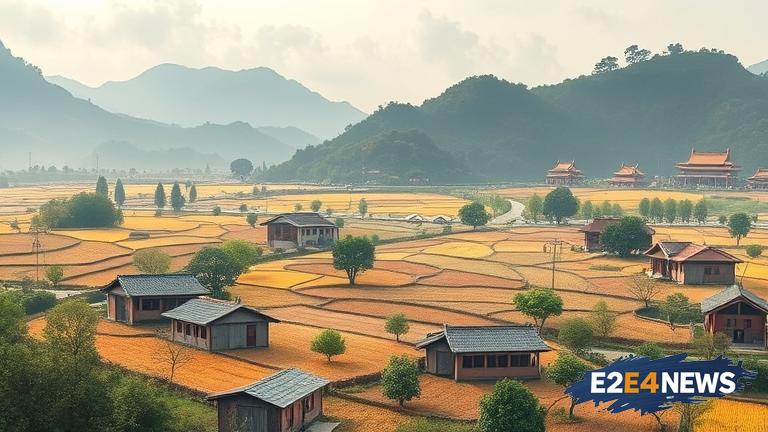China’s latest initiative aims to revitalize rural areas by promoting sustainable agriculture, improving infrastructure, and providing social services. The plan, announced by the Chinese government, seeks to address the pressing issues of poverty and inequality in rural regions. With a strong emphasis on eco-friendly practices, the initiative encourages farmers to adopt environmentally sustainable methods, reducing the country’s carbon footprint. Furthermore, the government will invest heavily in rural infrastructure, including roads, bridges, and public transportation, to facilitate connectivity and accessibility. The plan also prioritizes education and healthcare, with a focus on providing quality services to rural communities. In addition, the government will implement policies to support rural entrepreneurship, encouraging locals to start their own businesses and create job opportunities. The initiative is expected to have a significant impact on China’s rural population, improving their overall standard of living and contributing to the country’s economic growth. China’s rural development plan is a crucial step towards achieving the United Nations’ Sustainable Development Goals, particularly in regards to poverty reduction and environmental protection. The government’s commitment to sustainable development is evident in its efforts to promote renewable energy sources, reduce pollution, and conserve natural resources. The plan also highlights the importance of social welfare, with a focus on providing support to vulnerable groups, including the elderly, women, and children. By addressing the unique challenges faced by rural communities, the government aims to create a more equitable society, where everyone has access to opportunities and resources. The initiative is a testament to China’s dedication to reducing poverty and promoting sustainable development, serving as a model for other countries to follow. China’s rural development plan is a complex and multifaceted initiative, requiring the collaboration of various government agencies, NGOs, and local communities. The government will work closely with international organizations, such as the World Bank and the United Nations, to share best practices and expertise. The plan’s success will depend on the effective implementation of its policies and programs, which will require careful monitoring and evaluation. The government has established a robust framework for tracking progress, ensuring that the initiative stays on course and achieves its intended objectives. China’s rural development plan is a significant step towards creating a more prosperous and sustainable future, not only for its rural population but also for the country as a whole. The initiative has the potential to drive economic growth, reduce poverty, and promote environmental protection, making it a vital component of China’s overall development strategy. As the plan unfolds, it is expected to have a positive impact on China’s rural communities, improving their livelihoods and contributing to the country’s long-term prosperity. The government’s commitment to rural development and poverty alleviation is a key aspect of its efforts to create a more equitable and sustainable society. By prioritizing the needs of rural communities, the government is demonstrating its dedication to reducing poverty and promoting social welfare. The initiative is a crucial step towards achieving China’s development goals, and its success will have far-reaching implications for the country’s future. China’s rural development plan is an ambitious and comprehensive initiative, requiring significant investment and resources. However, the potential benefits are substantial, and the government is confident that the plan will have a lasting impact on China’s rural communities. The initiative is a testament to China’s commitment to sustainable development and poverty reduction, serving as a model for other countries to follow. The plan’s focus on sustainable agriculture, infrastructure development, and social services makes it a holistic and integrated approach to rural development. By addressing the complex challenges faced by rural communities, the government aims to create a more prosperous and equitable society, where everyone has access to opportunities and resources.





